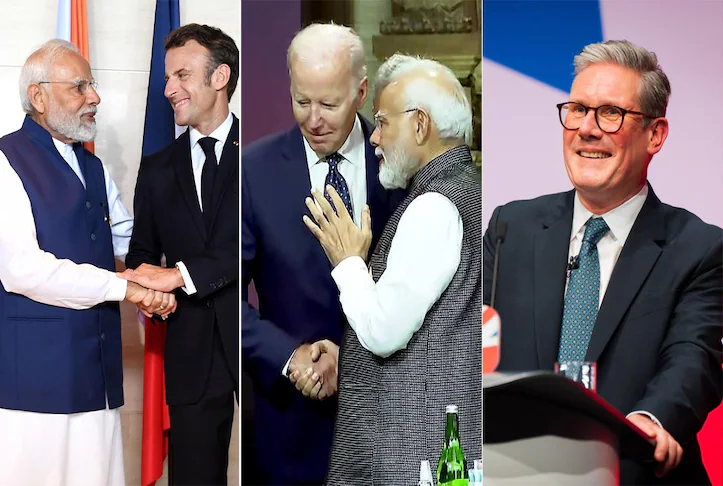UK PM Keir Starmer Backs India for Permanent UNSC Seat: An In-Depth Look
Summary
UK Prime Minister Keir Starmer recently voiced his strong support for India’s bid to secure a permanent seat on the United Nations Security Council (UNSC). This move comes after similar endorsements from global leaders like US President Joe Biden and French President Emmanuel Macron. With the increasing importance of India on the global stage, the call for its inclusion as a permanent member is growing louder. Starmer’s statement further amplifies the pressure on global powers to reform the UNSC structure.
India’s Bid for a Permanent UNSC Seat: The Journey So Far
India’s journey toward seeking a permanent seat on the UNSC has been long and marked by persistent efforts. Since the United Nations was established, the UNSC has held significant power in maintaining global peace and security. Currently, it includes five permanent members—China, France, Russia, the United Kingdom, and the United States—all of whom wield veto power.
But why hasn’t India, the world’s most populous democracy and an emerging global power, secured a permanent seat yet?
India’s Contributions to Global Peace
India has consistently been one of the largest contributors to UN peacekeeping missions. It has a history of playing a significant role in peace and stability efforts around the world, which bolsters its claim for a permanent UNSC seat. Over the years, Indian troops have participated in numerous UN peacekeeping operations, and the country has advocated for multilateralism and peaceful resolutions to global conflicts.
Growing Global Influence
India’s economic and geopolitical influence has grown tremendously over the past few decades. It is now recognized as one of the major players in shaping global policies, particularly in areas like climate change, economic development, and global health. India’s leadership in international platforms such as the G20 and BRICS has further solidified its status as a key player in global diplomacy.
Calls for UNSC Reform
One of the most significant arguments in favor of India’s inclusion is the need to reform the UNSC to reflect the realities of the 21st century. The current composition of the council reflects the world order post-World War II, a time when colonial powers dominated the international arena. However, the global power dynamic has shifted dramatically since then, with countries like India, Brazil, Japan, and Germany rising as influential global actors.
Leaders from various countries, including the US and France, have acknowledged the need for a more inclusive UNSC. The United Nations itself has faced growing pressure to make its governing bodies more representative and democratic.
Keir Starmer’s Endorsement: What Does It Mean?
UK Prime Minister Keir Starmer’s endorsement of India’s bid for a permanent UNSC seat carries significant weight. The UK has long been a global leader, and its voice on such matters holds considerable influence. Starmer’s support adds to a growing consensus among global leaders that the time has come for the UNSC to evolve.
Why is Starmer’s Support Important?
While the UK has historically had close ties with India due to their colonial past, their modern relationship is largely built on trade, diplomacy, and shared interests in global governance. Starmer’s support reflects the UK’s recognition of India’s importance in the current global landscape. It also signals the UK’s commitment to fostering strong bilateral ties with India, especially as post-Brexit Britain looks to strengthen its relationships outside the European Union.
The US and France: Previous Support
Starmer’s backing follows similar endorsements from US President Joe Biden and French President Emmanuel Macron. Both leaders have expressed their belief that India deserves a permanent seat at the UNSC table. Macron went a step further, calling for a “reform” of the UNSC to make it more inclusive and representative of today’s global power structures.
Challenges Ahead
Despite these endorsements, India’s path to a permanent seat is not without challenges. The UNSC’s structure requires consensus among the current permanent members, and any changes to the council’s composition would require their agreement. China, one of the permanent members, has historically opposed India’s bid, citing political and strategic reasons. This remains a significant roadblock for India.
Additionally, reforming the UNSC would require the agreement of two-thirds of the UN General Assembly’s 193 members, a daunting task given the differing interests of various nations.
India’s Vision for Global Governance
India’s vision for global governance is centered around fairness, democracy, and multilateralism. As a country that has often championed the voices of developing nations, India advocates for a more inclusive and balanced approach to global decision-making.
Climate Change and Sustainable Development
One of the areas where India has shown leadership on the global stage is in climate change and sustainable development. Prime Minister Narendra Modi has been a strong advocate for addressing climate change, particularly through initiatives like the International Solar Alliance (ISA), which India spearheaded. By having a permanent seat on the UNSC, India could bring these critical issues to the forefront of global security discussions.
Global Health and Pandemic Response
India played a pivotal role in global health, especially during the COVID-19 pandemic. The country emerged as one of the world’s largest vaccine producers and provided millions of vaccine doses to countries in need, particularly in the Global South. This humanitarian approach underscores India’s commitment to global solidarity.
The Road Ahead: What’s Next for India’s UNSC Bid?
The road to securing a permanent seat on the UNSC is complex and involves navigating through international diplomacy, geopolitics, and the differing interests of the current permanent members. However, with growing global support, India’s chances are stronger than ever.
Building Alliances
India will need to continue building alliances with key global players, particularly those who have veto power on the UNSC. The support of countries like the UK, US, and France is a crucial step, but India will also need to engage with China and Russia to ensure they do not block its bid.
Reforming the UN Charter
Any change to the UNSC’s composition requires an amendment to the UN Charter, which governs the structure of the council. This process is no small feat, as it requires not only the approval of the UNSC’s permanent members but also a two-thirds majority in the UN General Assembly. India will need to rally global support and advocate for a reform that reflects the current geopolitical realities.
Continued Leadership on Global Issues
As India pushes for a permanent seat, it must continue demonstrating leadership on critical global issues like climate change, economic development, and peacekeeping. By doing so, India strengthens its case as a responsible and influential global power that can contribute meaningfully to the UNSC’s mission of maintaining international peace and security.
Conclusion: A Permanent Seat for India—A Matter of When, Not If?
The call for India’s inclusion as a permanent member of the UNSC is growing louder, and with the support of major global powers like the UK, US, and France, India’s chances have never looked better. However, challenges remain, particularly in garnering unanimous support from the current permanent members and securing the necessary reforms.
As India continues to rise on the global stage, its bid for a permanent UNSC seat seems less a matter of “if” and more a matter of “when.” The time has come for the UNSC to evolve, and India’s inclusion would mark a significant step toward making the council more representative of today’s world.
FAQs
- Why is India seeking a permanent seat on the UNSC?
India seeks a permanent seat to have a greater role in global governance, reflecting its growing influence in world affairs. - What challenges does India face in securing a UNSC seat?
India faces opposition from some current permanent members, particularly China, and must navigate the complex process of UN reforms. - Why is Keir Starmer’s endorsement significant?
As the UK Prime Minister, Starmer’s backing adds considerable weight to India’s bid, signaling strong support from a major global power. - How would India’s inclusion benefit the UNSC?
India would bring perspectives from the Global South, advocate for climate action, and promote democratic multilateralism. - What are the next steps in India’s UNSC bid?
India must continue building global alliances, push for UN reform, and address opposition from key UNSC members like China.





